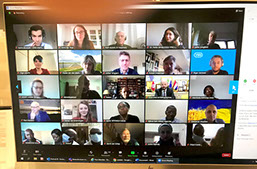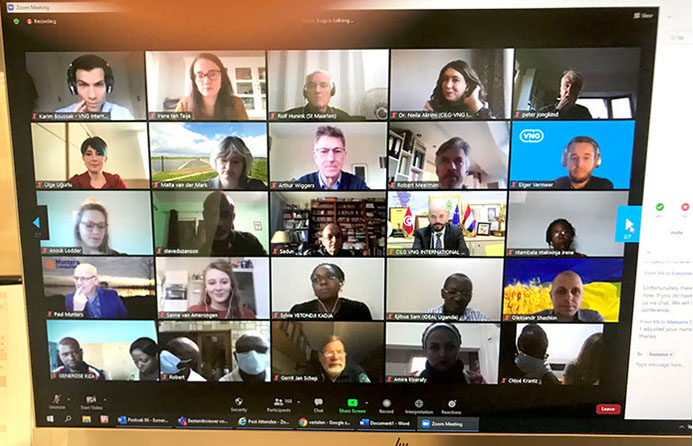Annual Update 2022 VNG International
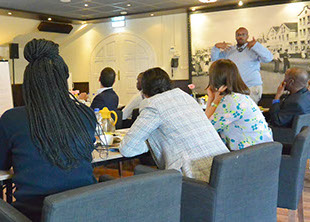
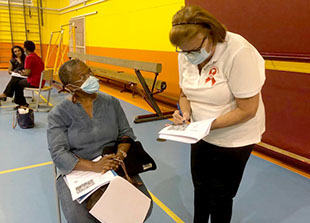
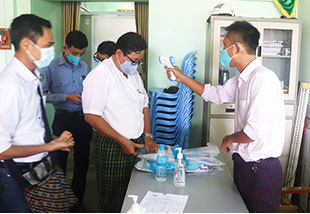
Human Resources
Staff and experts
As per 31-12-2021, the total number of staff in our head office in The Hague was 55 and the total in FTE 50.6. In 2021, 8 staff left the organisation and 8 joined. Like in 2020, we did not have to reduce the staff as a consequence of the pandemic.
The average age of the staff on 31-12-2021 was 38. Of the 55 staff, 71 % are women and 29 % are men. At management level, the division is just the other way round, with 60% men and 40% women. This is more equal than a year ago, due to a reduction of the size of the management team from 6 to 5. Our daughter company in Tunis and the project offices together have almost 150 people on the payroll. In addition we have a large group of external experts who provide their services on a contractual basis. Among them is a core group of 37 associated experts who work for us on a regular or long-term basis.
Workers Council
We respect the principles of the relevant International Labour Standards and there is regular dialogue with the representative workers council (OR). An important subject for dialogue, in 2021 and ongoing, is the planned restructuring of the internal organisation in the head office in The Hague. The plans entail, among others, the formation of smaller teams in combination with cross-cutting taskforces for areas such as the internal training of staff; quality and improvement; and business development and innovation. With the proposed changes, we also hope to strengthen the ownership and (preparation of) decision-making lower in the organisation.
Another important subject for dialogue were the results of the Employee Satisfaction Survey, held among Headquarters staff in The Hague in October-November 2021. The results have been shared and discussed with the whole team, and the most important positive points and points for improvement, including follow-up measures, have been defined in a collaborative effort with the team and the Workers Council.
Other issues that have the joint attention of OR and Management include the issues described below, and other ones like diversity and inclusiveness in our HR-policy, and the financial performance of the organisation including important investments.
Investment in training and personal development
To encourage staff to keep their skills and knowledge up to date, and to invest in personal development, we budget 2.4% of our total gross salary costs for this purpose. Due to Covid restrictions on group trainings, we did not spend the whole amount in 2021, as was also the case in 2020. Nevertheless, next to individual coaching, a range of trainings have taken place, including a.o. on project management skills, effective communication, and time management.
Also our internal knowledge sharing continued online. Regular ‘brown bag’ meetings at Headquarters covered a range of topics including Monitoring and Evaluation skills and tools. In January 2022, like in 2021, also our annual ‘international staff meeting’ took place online, again with more participants than would otherwise have been possible. These meetings are much appreciated and made us decide to organise them more frequently, 4-5 times a year.
Special attention was given to the issue of diversity and inclusiveness. A VNG-wide policy note on diversity and inclusiveness was adopted and all managers received a two-day training to raise awareness of their personal opinions and attitude related to this subject. Another training was organised on diversity and inclusiveness in the recruitment process.
Sick Leave and Prevention
Throughout 2021, the pandemic continued to have major implications for our work. The restricted access to our office in The Hague required a continued effort from all staff to adjust not only our ways of collaborating, but also each own’s work organisation. We provided support facilities and office equipment where possible as well as financial contributions, but nevertheless the situation was hard to bear for some of our colleagues, also due to the home situation, for instance with young children who could not go to school. Working in the office is getting more common again, but we expect that a new balance will develop between working from home and in the office. This is supported with adjustments in the office to facilitate hybrid meetings and with a project called ‘On/Office’ to facilitate (the discussion on how) finding the balance.
Furthermore, the fact that visits to partner or beneficiary organisations were hardly possible, due to travel restrictions, and the effect this had on relationships within the project and on project implementation, sometimes had a negative impact on work satisfaction and motivation. On the positive side it should be noted that our investments in online instruments for communication and for project interventions show results, and that donors also in 2021 showed the necessary flexibility by accepting either delays or revised project interventions.
The overall sick leave percentage for 2021 was 4.1%. This is a slight increase compared to 2020, possibly as an effect of the continued pandemic. Continuous attention is required for the workload and workload perception of each employee. Prevention remains a high priority, for which the managers, the external ‘arbodienst’, and the employees themselves, all have their own and a joint responsibility.
Next to the preventive measures mentioned above, other ones vary from internal coaching, encouraging the participation in fitness programmes, to offering the possibility of working part-time for a better balance between work and the private situation. In case of sick leave, we use the services of the ‘arbodienst’ to jointly define appropriate measures in line with the applicable legal provisions.
Safety and Security
As indicated above, the COVID-19 pandemic continued to cause travel restrictions throughout the year, although less than in 2020. Vaccinations have contributed to tempering the spread and the seriousness of infections, and all staff have been asked regularly to observe other preventative measures. Now that the risks and the restrictions have further decreased, we have also lifted the provision that permission to travel required a Management Team decision.
Much attention has also gone to the safety and security consequences for our staff in countries with situations of unrest or conflict. The war in Ukraine, the (aftermath of the) coup d’etat in Mali, Myanmar, Sudan, the ongoing tensions or conflict in a.o. DR Congo, Ethiopia, Iraq, Lebanon, Libya, Palestine, Somaliland and Tunisia, all have a major impact on our staff working for projects in the countries mentioned.
Early 2021 in Myanmar and at the end of 2021 in Ethiopia, the situation deteriorated to such an extent that our international staff had to be withdrawn from the country and that project implementation had to be downscaled drastically. After the Russian invasion in Ukraine on 24 February 2022, we had to scale down and change our activities and evacuate staff, and experts had to flee or relocate.
Two more safety and security incidents have been reported in 2021, both in DRC. In both cases there has been no direct threat for our staff. Another incident occurred in Ethiopia with a local staff member, under the state of emergency. We have monitored his situation and local staff have provided support until the situation was solved.
Colleagues concerned are offered support in addressing the mental effects of the situations mentioned above. We have become aware that more systematic attention for the (possibility of) mental effects is needed. This will be incorporated in the revised safety and security policy. The VNG Fund for emergency relief, reconstruction and peacebuilding has been used to receive donations for humanitarian support to some of our colleagues in Myanmar and to receive donations from Dutch municipalities for support to our counterpart in Ukraine, (the Association of) Ukrainian Cities.
Code of Conduct
The VNG International Code of Conduct is embedded in the VNG-wide ‘VNG policy against misconduct’, which includes a ‘whistle blower’ regulation, and also relates to a VNG International specific complaints procedure. Within the VNG organisation, employees can address on a confidential basis three confidants (‘vertrouwenspersonen’).
VNG International maintains a register for reported cases of misconduct. Cases are treated with respect for privacy. As many as necessary details about (the character of) the case, and about the actions taken or to be taken, are registered. In 2021, no cases have been reported of breaches against the Code of Conduct by our staff or experts.
Furthermore, the results of the employee satisfaction survey of 2021 show a good score -better than the benchmark- on all six questions related to misconduct by direct colleagues.
Despite these facts, and although we already bring the content and the spirit of the Code of Conduct to the attention of staff and experts on a regular basis, we feel that this can be done even more systematically and including also other stakeholders in our projects. We are currently implementing this (in 2022).
GDPR
Compliance with the General Data Protection Regulation (GDPR) continues to have our permanent attention. Within VNG we have a Data Protection Officer and a Privacy Advisor who, together with the Privacy Officers, monitor the application of the GDPR. The necessary procedures are in place and repetitive messages will keep the staff aware of the legal requirements.
A more comprehensive VNG privacy policy 2021-2024 was completed in 2021. In 2021 no complaints have been received. A few minor incidents occurred, but could be dealt with internally without a need for incident reports to the Dutch Data Protection Authority (AP).
